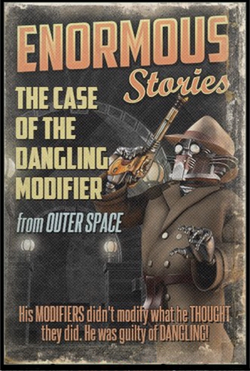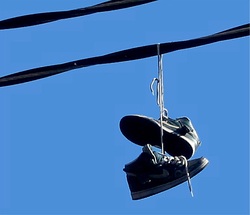
Misplaced Modifiers and Dangling Participles
There’s a reason many writers don’t show their first drafts to anyone but trusted friends--our first-draft errors can be downright embarrassing. And perhaps nothing is more capable of producing unintended giggles than a dangling modifier. Heck, even the name is giggle-worthy. So how and where do modifiers dangle?
Sometimes writers put adjectives and adverbs in places where they inadvertently change the meaning of sentences, often with humorous results.
The rule is: put the modifier immediately before the word you want it to modify.
 Modifiers, like shoes, shouldn't dangle.
Modifiers, like shoes, shouldn't dangle. This sentence introduces us to the shiny soldier, whereas the adjective “shiny” here is supposed to be modifying “buttons.”
The soldier’s shiny buttons caught and reflected the candlelight.
I nearly ran six miles this morning before breakfast.
...but something came up and you stayed home? The adverb “nearly” in this sentence is supposed to be modifying “six,” but appears to modify “ran” instead.
I ran nearly six miles this morning before breakfast.
When Participles Dangle
“What the bleedin’ ’eck is a participle?” you might be asking. Let’s get that out of the way first. A participle is a verb doing the work of an adjective.
An adjective is a word that modifies a noun.
A fast horse.
Adjective “fast” modifying noun “horse.”
A participle is a form of a verb that ends in “-ing” and also modifies a noun.
A galloping horse.
Participle “galloping” (from verb “gallop”) modifying noun “horse.”
 Beloved of lumberjacks everywhere
Beloved of lumberjacks everywhere A phrase that contains a participle is called—not surprisingly—a participial phrase.
Glancing at her lover
Seeking the shelter of the covered bridge
Buttering a scone
Of course by themselves, those participial phrases aren’t sentences. Their place in a sentence is to modify the subject noun by saying what the subject noun is doing.
Glancing at her lover, Lavinia trod upon the dance instructor’s foot.
Seeking the shelter of the covered bridge, Paul dodged another falling frog.
Buttering a scone, Chris pondered the legality of shooting people who run their lawnmowers at 6 A.M.
If you’ve put a phrase containing a verb at the beginning or end of a sentence, that phrase should modify the nearest noun. When you put something in the way of a participial phrase so that it can’t reach the noun it’s meant to modify, we say it’s dangling. When participles dangle, they do strange things to sentences.
When used correctly, the first phrase modifies the noun in the second phrase, and one flows into the other with no loss of meaning.
Believing herself to be in danger, Melanie notified the police.
Knowing sparks were likely to fly, James decided to avoid the whole discussion.
 Don't trust the cute.
Don't trust the cute. Fleeing down the darkened alley, Sandra’s handbag fell to the pavement.
Sandra’s handbag was fleeing down the alley.
Fleeing down the darkened alley, Sandra dropped her handbag.
Now the phrase modifies Sandra, as it should. Or you could ditch the participle entirely and use another sort of modifying phrase:
As Sandra fled down the darkened alley, her handbag fell to the pavement.
--
Having been bitten by a Chihuahua, Rollo’s trust in dogs was practically nonexistent.
A dog bit Rollo’s trust. Neat trick, that.
Having been bitten by a Chihuahua, Rollo felt an extreme distrust of dogs.
Now the phrase modifies Rollo, as is right and proper. Ditching the participle:
Ever since a Chihuahua had bitten him, Rollo had been suspicious of dogs.
Keep your modifying words and phrases with the words they modify, and no-one will ever be able to accuse you of illegal dangling.
TL;DR
Dangling modifiers don’t modify what their authors think they do.
To avoid unintentional hilarity, put your adjectives, adverbs, or participles immediately before the words you want them to modify.
COVER ART
All the fabulous pulp magazine covers on this article series were created using the amazing Pulp-O-Mizer from art by its creator, Bradley W. Schenck.

Thanks for linking to this blog!
Regan Wolfrom's Speculative Fiction Writing Wroundup
A Novel Experience - Best of the Week's Articles
Did I miss anyone? Let me know!
Part 1: The Most-Hated Writing Advice Ever
Part 2: Vampire Verbs, Zombie Verbs, and Verbs that Kick Ass
Part 3: Attack of the Adverbs!
Part 4: The Weakeners
Part 5: When Words Get in the Way
Part 6: Secrets of Relative Velocity
Part 7: Two Languages
Part 8: Dialogue Tags
Part 10: Passive Voice
Part 11: HomophonesPart 12: Point of View Violations













 RSS Feed
RSS Feed




